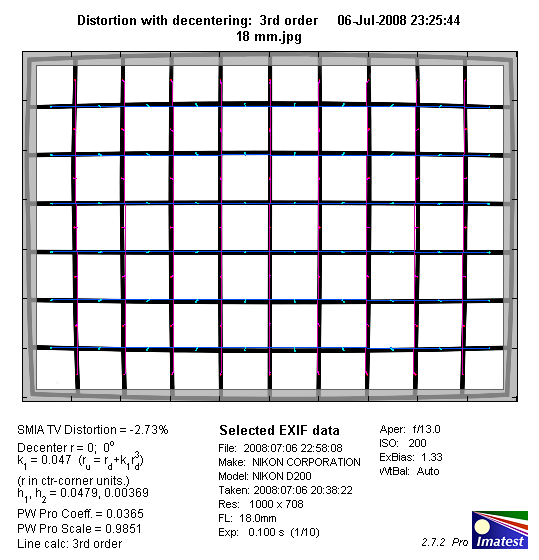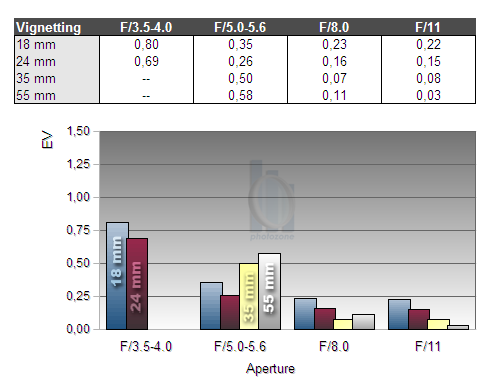|
Nikkor AF-S DX 18-55mm f/3.5-5.6G VR - Review / Test Report - Analysis |
|
Lens Reviews -
Nikon / Nikkor (APS-C)
|
|
Page 2 of 3

Distortion
The AF-S 18-55 VR shows quite typical distortion characteristics for a lens in this class. At 18mm there is very pronounced barrel distortion which is reduced to a moderate amount at 24 mm. At 35mm and 55mm the lens is basically free of distortion.
|
Move the mouse cursor over the focal length text marks below to observe the respective distortion
|
| 18mm |
24mm |
35mm |
55mm |
|

|
The chart above has a real-world size of about 120x80cm.
Vignetting
Vignetting is well under control, especially compared to the lens' predecessor. Wide open at any focal length, the lens shows light falloff towards the corners that can be visible and maybe disturbing, but stopping down just 1 stop reduces vignetting to a level that is hardly field-relevant anymore.

MTF (resolution)
Despite their cheap price and low build quality, kit lenses often show surprisingly high resolution. The AF-S 18-55 VR is no exception to this rule. The center resolution is excellent at any focal length and aperture, except at 50 mm, where it is "only" very good wide open and from f/11 onwards, but still on a very high level.
Borders and corners follow only slightly behind with very good to excellent resolution. Exceptions here are the extreme corners at 18mm and both borders an corners wide open at 24 mm. Stopping down 1 stop takes care of these issues, though.
Please note that the MTF results are not directly comparable across the different systems!
Below is a simplified summary of the formal findings. The chart shows line widths per picture height (LW/PH) which can be taken as a measure for sharpness.
If you want to know more about the MTF50 figures you may check out the corresponding Imatest Explanations

Chromatic Aberrations (CAs)
Just like vignetting, CAs (color shadows at harsh contrast transitions) are well under control for a lens in this class. With values up to 1.3 pixels at the image borders they can be visible and disturbing at the lower focal lengths, at 35mm and 55mm however CAs are hardly field-relevant. We certainly have seen worse behaviour from simlar lenses in this regard.
Note that CAs can easily be corrected in software or by the camera itself (most modern Nikon DSLRs remove CAs themselves if you shoot JPGs).

|